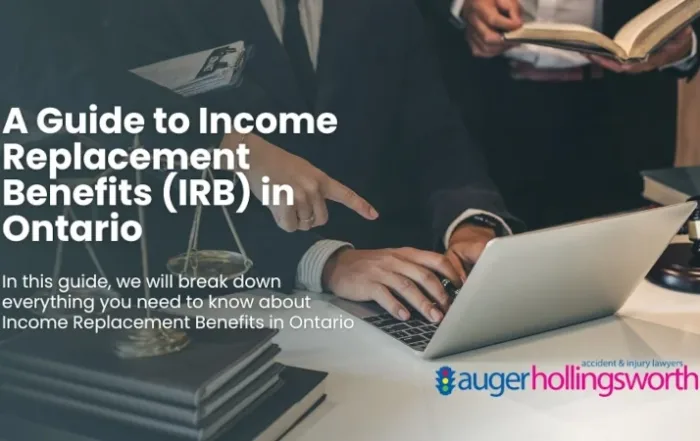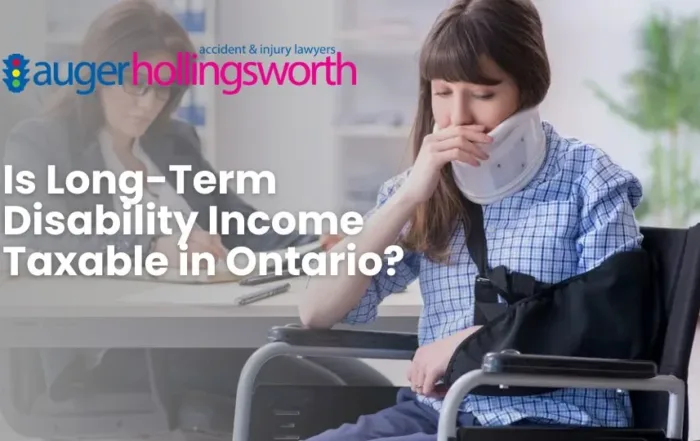GCS of 9 or Below as a Basis for Catastrophic Injury After an Ontario Accident
The Ottawa personal injury team at Auger Hollingsworth was recently successful at having our client identified as having suffered a catastrophic injury on the eve of a FSCO arbitration. The insurer had denied that our client was catastrophically injured, despite the fact that she was noted to have suffered a GCS of 9 and below in the initial period after the accident. The following is an excerpt from the legal argument we filed at FSCO.
ISSUES ON THE ARBITRATION
The primary issue in this arbitration is whether Client has suffered a catastrophic impairment under the Statutory Accident Benefits Schedule – Accidents on or after November 1, 1996, (“SABS”). Subsection 2(1.1)(e) of the SABS sets out the definition for catastrophic impairment as follows:
(1.1) For the purposes of this Regulation, a catastrophic impairment caused by an accident that occurs before October 1, 2003 is, …
e. brain impairment that, in respect of an accident, results in,
i. a score of 9 or less on the Glasgow Coma Scale, as published in Jennett, B. and Teasdale, G., Management of Head Injuries, Contemporary Neurology Series, Volume 20, F.A. Davis Company, Philadelphia, 1981, according to a test administered within a reasonable period of time after the accident by a person trained for that purpose, or [emphasis added]
ii. a score of 2 (vegetative) or 3 (severe disability) on the Glasgow Outcome Scale, as published in Jennett, B. and Bond, M., Assessment of Outcome After Severe Brain Damage, Lancet i:480, 1975, according to a test administered more than six months after the accident by a person trained for that purpose;
Source: Statutory Accident Benefits Schedule – Accidents on or after November 1, 1996, O.Reg. 403/96, s. 2(1.1) (e) [Book of Authorities at Tab 1].
ANALYSIS
Issue 1: Catastrophic Impairment
The opinion of the Riverfront assessors and the insurer in this arbitration is incorrect both in medicine (as set out by Dr. Marshall) and in law, as described herein.
- A. The test for catastrophic impairment is a legal test, not a medical test.
The case law is clear that the test to be applied to identify catastrophic impairment is a legal test, not a medical one. The leading case on this issue is the decision of the Court of Appeal for OntarioLiu v.1226071 Ontario Inc. It is clear from this decision that the interpretation of the relevant subsection of the SABS requires the application of a legal definition, not a medical test.
Source: Liu v.1226071 Ontario Inc, 2009 ONCA 571 at para. 27 [Book of Authorities at Tab 2].
In Liu, the Court of Appeal rejected the insurer’s argument that the fact that the claimant’s GCS rose from 3 to 12 within 33 minutes somehow took the claimant out of the section. The Court stated:
[27] In my view the answer to the respondents’ objection is the plain language of the legislation. Provided there is a brain impairment, all that is required is one GCS score of 9 or less within a reasonable time following the accident. It is a legal definition to be met by a claimant and not a medical test.
[28] I agree with the appellant’s submission that the fact that there may have been other higher scores also within a reasonable time after the accident is irrelevant.
[29] In my view the trial judge fell into error in equating the statutory test to a medical one. It is not.
[30] Any notion of catastrophic injury, other than the specific meaning ascribed to that term by the legislation must be discarded when considering whether a claimant meets the statutory test. The statutory scheme creates a bright line rule which is relatively easy to apply. This enhances the ability of those looking to the definition to know what injuries will and will not be considered catastrophic. Having the same definition for both no fault and third party liability claims avoids inconsistency. The ease with which the rule can be applied adds an element of predictability which will facilitate the settlement of claims.
[31] It matters not that there is some evidence – albeit disputed evidence – that the appellant is capable of managing his property, clothing, hygiene, shelter, safety and taking two trips toChina. Nor does it matter that his head injury was described as “moderate to severe” or “moderately severe”.
[32] All that is required is a brain impairment and a GCS reading of 9 or below within a reasonable period of time after the accident. The appellant met both criteria on the trial judge’s findings and is entitled to recover damages for health care costs in accordance with the verdict of the jury [emphasis added].
Source: Liu v.1226071 Ontario Inc, 2009 ONCA 571 at paras. 27-32 [Book of Authorities at Tab 2].
B. The presence of hypotension does not invalidate the GCS reading
In Young v. Liberty Mutual, Arbitrator Allen rejected the notion that GCS readings obtained in the presence of confounding factors such as intubation, sedation and post-accident seizures were invalid. The Arbitrator held that the legislature was presumed to understand that GCS readings would be influenced by post-trauma complications and yet chose not to create exclusions for these situations. As she held:
I find one must be able to assume the legislature was aware of these features of the GCS score when it chose it as a means to assess catastrophic brain impairment. Surely the legislature would not have intended to provide the GCS score as a measure of catastrophic impairment under circumstances where the very characteristics of this tool would rule it out as an appropriate measure. It cannot be intended by the legislature that the most seriously injured might not have the enhanced benefits available to them soon after the accident because their GCS scores were confounded by the severity of their injury. In the end, however, the GCS score is a tool medical assessors and adjudicators must work with in assessing catastrophic brain impairment.
…
I accept the Applicant’s view that a GCS score is not intended to project into the future the medical status of an applicant, but is rather a tool employed among medical practitioners to communicate the level of consciousness of a person who has sustained head trauma. It is employed under the Schedule as a measure of an injured person’s states of consciousness for a reasonable time after the accident in order to assess the level of brain impairment [emphasis added].
Source: Young v. Liberty Mutual, 2003 FSCO A02-000695, at pp. 25 and 28 [Book of Authorities at Tab 4] aff’d 2005 FSCO Appeal Order P03-00043 [Book of Authorities at Tab 5] and 2006 CanLII 7286 (ON SCDC) [Book of Authorities at Tab 6].
Accordingly, in this case, the Riverfront assessors’ opinion that Client ’s significant hypotension would somehow invalidate her GCS reading is incorrect in law.
C. The prognostic value of the GCS reading is not relevant
On appeal, the Director’s Delegate in Young v. Liberty Mutual, rejected the notion that a GCS reading would only be the basis for a finding of catastrophic impairment where the GCS reading was predictive of outcome. In that decision, it was held:
I agree with the arbitrator. Again, to return to the definition, “catastrophic impairment” means brain impairment that, in respect of an accident, results in a score of 9 or less on the Glasgow Coma Scale. None of the other provisions of the definition require a forecast of the insured’s future condition, so it is unclear why a forecast should be part of the GCS test. The definition on its face requires that the low scores result from a brain impairment, and accordingly the “reasonable period of time” requirement focuses on that point and not on a forecast. The matter would be different if, for instance, catastrophic brain impairment meant brain impairment resulting from GCS scores of 9 or less taken after a reasonable period of time. However, that would then start to resemble the GOS [subclause e(ii)] test, which does indeed look at the outcome of the insured after six months.
Source: Young v. Liberty Mutual, 2005 FSCO Appeal Order P03-00043 at 25, 26 [Book of Authorities at Tab 5].
In Tournay v. Dominion of Canada General Insurance Company, it was held:
[The GCS] is not intended to be administered in the manner of an insurer’s examination by someone retained to give the insurance company an independent opinion on neurological function. The GCS is a clinical test, pure and simple. Thus, if a medically appropriate GCS test registers a score of “9 or less” within a reasonable time after the accident, where the brain impairment as a result of the accident is not contested, then, in my view, that must be taken as satisfying Section 2(1.1)(e)(i) of the schedule.
Source: Tournay v. Dominion of Canada General Insurance Company, 2006 FSCO A05-000507 at 16 [Book of Authorities at Tab 8].
D. A broad reading is to be given to the section
A broad and inclusive interpretation of this subsection of the SABS is appropriate. The Honourable Mr. Justice Keenen in Holland v. Pilot Insurance Company states “This type of regulation is adopted by the legislature after extensive consultation with interested parties, including insurers. If restricted meaning is to be assigned to the regulation, it should clearly be recited in the regulation itself.”
Source: Holland v. Pilot Insurance Company, 2004 CanLII 13787 (ON SC) at para 24 [Book of Authorities at Tab 6].
It is respectfully submitted that Client meets the test for catastrophic impairment. She sustained a brain impairment, which continues to impair her. She had a GCS reading of 9 or less in respect of an accident. The GCS reading was administered within a reasonable time after the accident. The readings were taken by persons trained for that person. Accordingly, all of the statutory pre-requisites are met.














